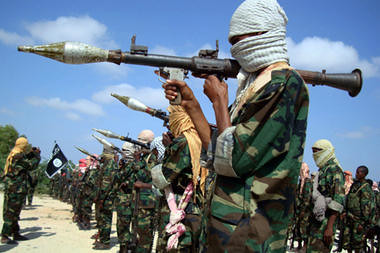
Somalia al-Shabab resistance fighters inside the country where a US-backed regime is attempting to dominate the Horn of Africa state. A notice about potential attacks in Kenya was discredited as a fake claim., a photo by Pan-African News Wire File Photos on Flickr.
Somali militants threaten suicide attacks in Kenya
MOGADISHU, Somalia (AP) – Somali militants threatened to bring down Nairobi skyscrapers after Kenya sent hundreds of troops into Somalia. The threat emanated from the same lawless country in which the al-Qaida masterminds behind 1998 bombings of two U.S. embassies sought refuge.
The Kenyan invasion comes at a time when al-Shabab has been weakened by famine in its strongholds, has been pushed from the capital of Mogadishu by African Union troops and finds itself increasingly challenged by clan militias.
The U.S. has also launched airstrikes against al-Shabab leaders amid concerns over terrorist training camps in the failed state of Somalia. The men who masterminded the 1998 bombings of U.S. embassies in Kenya and Tanzania found shelter in the chaos of its 20-year-old conflict.
Al-Shabab lashed out in a news conference and an eloquent English statement on Monday, saying that the "bloody battles that will ensue as a result of this incursion will most likely disrupt the social equilibrium and imperil the lives of hundreds of thousands of civilians."
The statement urged Kenyans to tell their "saber-rattling politicians" to not let the "flames of war" spill over into Kenya, destroying the East African nation's sense of stability.
"Your skyscrapers will be destroyed, your tourism will disappear. We shall inflict on you the same damage you inflicted on us," Sheik Ali Mohamud Rage, a spokesman for the Islamist militia al-Shabab, said at a Mogadishu news conference.
Kenya on Sunday moved two battalions of about 800 troops each across the border in two locations, a Nairobi-based official said. Tanks, helicopters and artillery have also been deployed. The invasion is the most significant foreign deployment of the Kenyan military since independence from Britain in 1963.
The official asked for anonymity because he was not authorized to speak to the press.
Maj. Emmanuel Chirchir, a Kenyan military spokesman, would only say there were "sufficient" troops in Somalia. He would not disclose their final objective, how long they were prepared to stay or any other details. He did say that five Kenyan military personnel were killed when their helicopter crashed near the border on Sunday.
Kenya says the invasion is retaliation for the kidnappings of four Europeans — two aid workers and two tourists — from Kenyan soil. An Englishwoman was taken last month by gunmen who killed her husband, a Frenchwoman was seized two weeks later and two Spanish aid workers were taken from a refugee camp near the border on Thursday. The attacks have already hit Kenya's tourism industry, the country's third biggest foreign exchange earner last year.
But Europeans have been kidnapped before, and it is still unclear if al-Shabab carried out the attacks. Analysts also say it is "highly unlikely" that Kenya could organize such a complex military operation so quickly.
"The kidnaps could be a catalyst for something in the works for a long time," said Lauren Gelfand, the Africa and Middle East editor of Jane's Defense Weekly.
The Kenyans had already been conducting air strikes in Somalia for the past two weeks, a Nairobi-based diplomat said. He asked for anonymity because he was not authorized to speak to the media.
Al-Shabab itself dismissed the kidnappings as a motivation.
"The allegations put forward by the Kenyan authorities with regard to the recent kidnappings are, at best, unfounded and, apart from the mere conjectural corroborations, not substantiated with any verifiable evidence," the al-Shabab statement said.
Last year al-Shabab suicide bombers killed 76 people in Kampala, Uganda as they watched the World Cup final. The group said it was retaliation for Uganda sending troops to the African Union force supporting the weak U.N.-backed government.
Rage, the al-Shabab spokesman, raised the image of the bombings Monday.
"Remember what happened in Uganda's capital," he said.
So far al-Shabab has put up little resistance to the Kenyan forces, melting away into the thorny scrub. A militia supported by the Kenyans took control of Qoqani, about 60 miles (100 kilometers) from the Kenyan border, late on Sunday, residents said.
Residents in the nearby town of Afmadow said al-Shabab fighters were leaving, but that families were also fleeing into the bush, preferring to sleep in the open and face wild animals than risk any fighting.
"We know there are lions in the jungle but fighting is worse," said Abdiqadir Mohamed.
Kenya's final objective remains unclear. It has spent the last two years pushing for a buffer zone between itself and troubled Somalia. Kenyan forces trained and equipped the so-called Jubaland militia of more than 2,000 Somalis and have frequently said they want to take Kismayo, a port city whose customs revenues are the insurgency's biggest cash cow.
Al-Shabab's key line of defense for Kismayo is in front of the Juba river. There are only three bridges across it strong enough to take the movement of vehicles. On Monday, bearded men wearing masks drove around Kismayo, using megaphones to urge residents to join the fight, residents said. The insurgents have a history of kidnapping children to use as child soldiers.
Families in Kismayo said they were already fleeing, fearing forced recruitment.
"Every family is running away with his children," said resident Nuh Abdi. "Otherwise al-Shabab will conscript them for fighting."
No comments:
Post a Comment